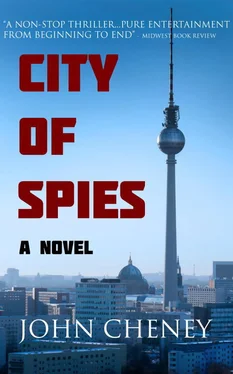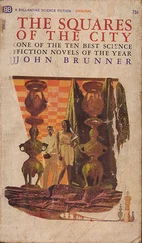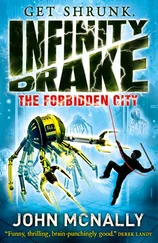The man leaned forward, eagerly engaged. “Hitler failed because he was greedy and foolish. Had he never invaded the glorious Soviet Union, he would not have brought vengeance on Germany. But his early tactics, the blitzkrieg , worked. And like that, we bring a massive lightning strike… infantry, artillery, paratroopers… all at once, converging on the center of Berlin. After all, we caught the West unprepared when we mobilized thousands of troops in the dead of night to build the Wall; we could do it again to take the city. The operation would work. West Berlin would be ours.”
Junker groaned. “This is all academic.”
“Well, comrade, actually…” the man cleared his throat. “Let me remind you, our defense ministry likes to leave nothing to chance. The plans are constantly critiqued and revised. Our soldiers are consistently drilled for war, held at a high readiness for combat, able to go into action within a few hours’ notice. We are prepared to deliver such an attack.”
“Could these plans that you speak of,” Fass said, his words dripping with scorn, “name you, Comrade Scharf, as the Stasi’s provisional leader of an occupied West Berlin?”
“That’s sensitive information!” an obscure Stasi major blurted out.
“Well,” Fass countered, “I figure if we’re here to have a frank and honest discussion, we should all be in possession of the full facts.”
Scharf eyed Fass with a clear eye of disdain, but his next words surprised many at the table, even turning them back to his side. Scharf delivered them with a politician’s ease and an actor’s earnestness. “I do not advocate such drastic measures for personal profit, Comrade Fass. I do so because the situation is dire. I am familiar with the details of this plan, and believe me, it is the best chance we have to rescue our country from free-fall. What would you rather do? Watch as it crumbles around you? Comrades, to stop the bleeding we must dress the wounds! At the very least, occupying West Berlin gives us leverage with which to work ourselves out of a complete downfall.”
Junker shook his head and tried to bring clarity to the discussion. “Look, regardless of our motives and theories, the plan simply won’t work. There’s no way to ensure there’ll be no NATO casualties. The American garrison measures five thousand men alone, not to mention the British and the French…”
“To hell with the French,” Scharf spat.
“But not the Americans,” Fass protested. “It’s an act of war. They’ll be committed to answer.”
Scharf stared at Fass, a look that was piercing. “What answer would that be? A nuclear attack? Impossible. The doctrine of Mutually Assured Destruction ensures neither side will initiate a nuclear attack, even after a maneuver of conventional warfare.”
“But what about conventional retaliation, perhaps along the border?” Junker argued. “That could lead to escalation.”
“That is why they can’t do it,” Scharf said. “Believe me, comrades, as much as NATO claims they are committed to Berlin, they won’t engage in a third World War over it. The Soviets are our allies. They’ll have to back us, but they’ll do it successfully with no more than diplomacy and threat of power.”
“That’s an assumption,” Müller finally said. As the ultimate authority in the room, his words, though rarely heard in these meetings, were gospel. “And there would still be hell to pay. A move like this changes the game.”
The room fell silent. The men understood Müller’s statement as a debate-ending decree. Yet Scharf could not resist one more challenge to authority. He looked into the eyes of each of the men surrounding the table. “It is time for a radical change. The survival of our country depends on it. Moscow will not save us. We must do that alone.”
When the meeting adjourned, Hans followed Müller out into the corridor. He waited until they were out of earshot of the other officials before quietly addressing his mentor. “What just happened in there?”
Müller paused at the top of a stairway and turned to Hans. He eyed the far end of the corridor carefully as he spoke in hushed tones. “Why don’t you come over for dinner tonight? We can discuss everything in detail then.”
“Fine.” Still bewildered, Hans watched as Müller jaunted down the staircase.
Müller paused just before moving out of sight and looked back at Hans. He gave a short nod of assurance, and then was gone.
That evening, Hans drove to the Politburo compound in Wandlitz, an exclusive, Western-like community outside of Berlin. Here Honecker and all the top officials lived in houses that were lavish in comparison to the average GDR apartment. The compound was secured by guards of the elite Felix Dzerzhinsky unit, a specially trained military force at the Stasi’s exclusive command. Hans checked in with the guards at the main gate before proceeding to Müller’s two-story home. Müller greeted Hans warmly at the door and ushered him inside. After offering Hans a drink, the two men proceeded to Müller’s patio. There, lit only by the light from the living room, the two men talked openly.
“I suppose you’re wondering what you’ve gotten yourself into,” Müller said. Hans nodded as he took a gulp of his drink. Müller laughed. “Well, now you know, despite all outward appearances, our government is no united body. Comrade Richter was correct—the economic situation is dire—there’s just no consensus on how we can effectively fix it.” Müller noticed the look on Hans’ face and continued. “But that’s not what you wanted to ask me about, I’m sure.”
“No, it isn’t,” Hans said. “What about the other man—I believe I heard someone call him Comrade Scharf.”
“Karl Scharf,” Müller nodded as he sat across from Hans. “A colonel in the Stasi. There’s something you need to know about him.” Müller leaned forward. “He was orphaned in the firebombing of Dresden. Wandered the streets for four years as a child. They say, when he was ten years old, he bashed another boy’s head in.”
Hans blinked in response.
“The boy stole Scharf’s bread,” Müller explained. “He was finally taken into a state orphanage when he was twelve. They became his surrogate parents. Scharf knows nothing but survival and the communist party. That combination enables a rise to power.”
“And you think it shouldn’t?” Hans asked.
Müller twitched, as if he wanted to shake his head, but resisted the notion. “He’s won favor with the Minister of State Security, and the support of numerous colleagues. But a man who quietly gains that much power should be watched carefully.”
“That can’t be easy to do when he’s got the Minister of State Security backing him,” Hans said. “But I still can’t understand why Scharf would openly propose such a radical plan.”
“Scharf’s objective is not secrecy,” Müller explained, “at least in getting the plan to go forward. He doesn’t need it. What he needed to do—and did extremely well—was determine the points of greatest opposition. There were many ministers in that meeting who agreed with him. They didn’t say anything, because he wanted to see who was against him.”
“You spoke up.”
“I had to,” Müller said. “I’m the presiding authority at those meetings. Scharf can’t get to me yet—but believe me—he will get to those he can.”
“Then what should I do?”
“For now, nothing. But soon we’ll have to watch Scharf very closely.”
“It was much easier just being a soldier,” Hans said ruefully.
“You’ll have to get used to how things work in politics, Comrade Brandt, if you’re to stay in your new position for long. Politics is a whole different battle.”
Читать дальше












